February 18, 2025: Albemarle County Police provide details on Crozet shooting that left three dead
Plus: Charlottesville is seeking input on potential changes to East High / Meade triangle
We are now in the second quarter of the 21st century and the number of people who remember elements of the 20th century will continue to go down each day. Unless there are immortals living among us, no synapses are currently firing that can remember the 19th, 18th, or even 17th century.
That means no one is still alive who was present in Charleston, South Carolina, for the opening night of the first opera to be performed in North America on this day in 1735. Can this fact be believed? Jump down to the bottom of this February 18, 2025 edition of Charlottesville Community Engagement for very quick research. I’m Sean Tubbs, and exploring humanity’s diversity is one key to maintaining my sanity.
In today’s installment:
Albemarle County Police have identified the two people killed in yesterday’s shooting in the parking lot of a Crozet grocery store that also saw the assailant shot and killed by an off-duty federal law enforcement office
Charlottesville is seeking public feedback on three potential options for changes to the intersection of Meade Avenue and East High Street
A summary of some of the February 10 budget meeting between Charlottesville City Council and the School Board
The Virginia General Assembly is heading toward an end and a look at unsuccessful legislation this year
First shout-out: Alliance Française de Charlottesville
The Alliance Française de Charlottesville promotes the French language and francophone culture through educational and cultural programs. Visit the Alliance Française website to learn more about group classes, private lessons, cultural events, and social activities for both kids and adults.
Three people dead after shooting in Crozet parking lot
The Albemarle County Police Department has released more information on a shooting incident that left three dead on the afternoon of February 17.
“Our staff has worked diligently since yesterday afternoon to analyze surveillance footage, speak with eyewitnesses and collect forensic evidence at the scene,” said Captain Darrell Byers at a press conference Tuesday afternoon.
In a statement released at 1:08 p.m. today, police report that 28-year-old Justin Barbour of Crozet shot an AR-15 rifle at the front door of the Harris Teeter grocery store as 43-year-old Peter Martin was leaving. Martin was killed.
Barbour then allegedly approached 68-year-old Diane Spangler of Afton and shot her while she was in her car. Spangler was transported to the UVA Medical Center and later died from her wounds.
“An off-duty federal law enforcement officer who heard the gunfire and was exiting the Harris Teeter engaged the shooter with their personal weapon,” reads the information release.
This person, who was not injured and has not been identified, shot and killed Barbour. Barbour had no criminal history but did have a recent encounter with law enforcement. Police are investigating if Barbour specifically targeted his victims.
"We owe an immense debt of gratitude to an off-duty Federal Law Enforcement Professional who happened to be at the shopping center when the shooting occurred,” the release quotes Albemarle Police Chief Sean Reeves. “This heroic individual selflessly placed themselves in harm's way to stop the gunman and prevent further loss of life. Without their brave actions, the casualty count could have been much higher."
During the press conference, Chief Reeves refused to name the assailant though it was provided in the announcement. The name of the off-duty officer was not revealed publicly nor the agency for which they work. Reeves said the person will not be charged.
The investigation will continue to try to establish any potential motive.
“We ask that anyone who was in the area of Harris Teeter at the time of the shooting and has not yet spoken with an investigator to please contact Detective Holmes at 296-5807 or Crime Stoppers at 434-977-4000,” Byers said. “Even the smallest details may be helpful in our investigation.”
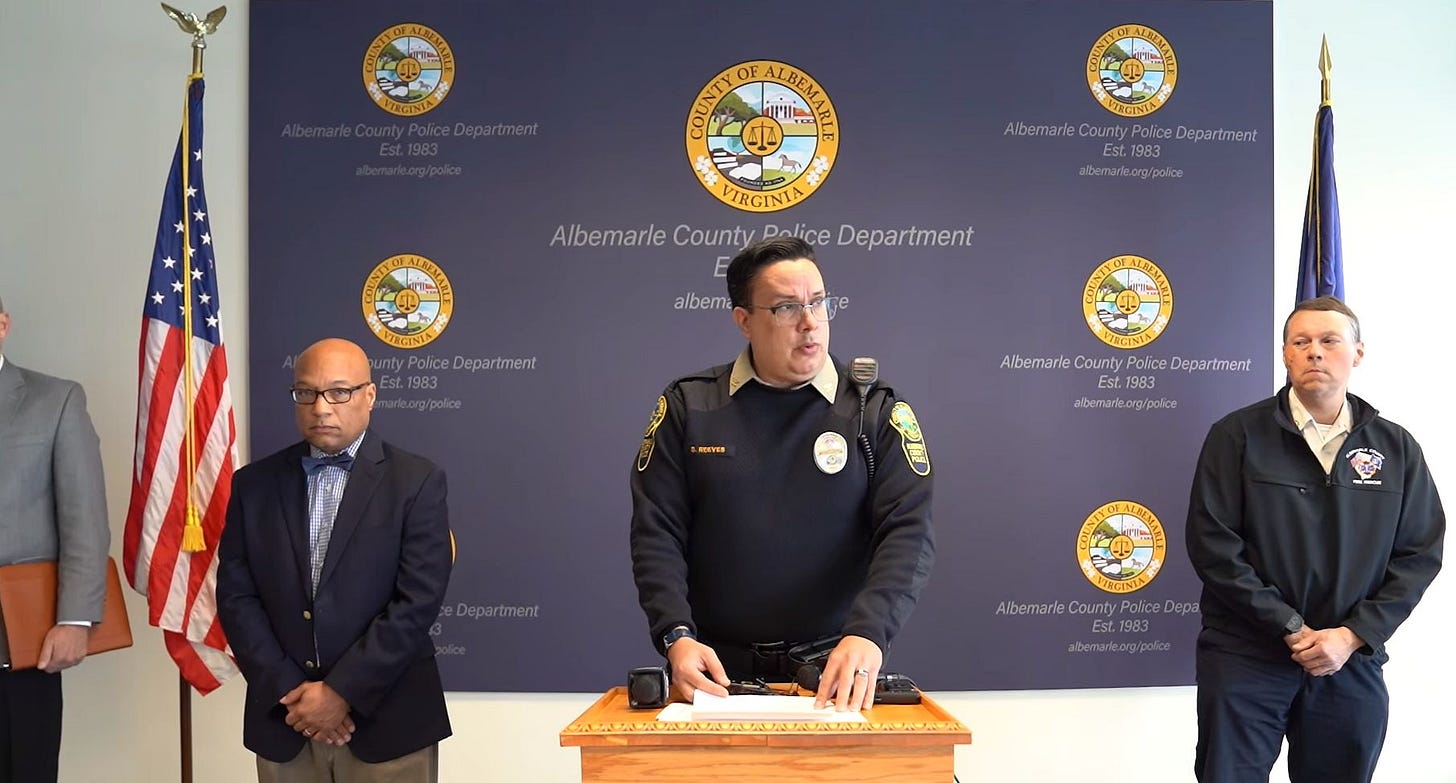
Three options proposed for pilot project at East High / Meade triangle in Charlottesville
In an effort to eliminate conflicts between pedestrians and motor vehicles, the City of Charlottesville is planning a series of ambitious projects to alter existing infrastructure.
One such project is anticipated in the area of East High Street. City officials are working with staff from the Thomas Jefferson Planning District Commission on a pilot project to demonstrate alternate traffic patterns. They’ve launched a survey to get feedback that is open through March 7. (take the survey)
A press release was sent out on February 14.
“We’ve heard from the community about safety concerns in this corridor,” said Ben Chambers, City of Charlottesville Transportation Planning Manager. “We welcome feedback from everyone—whether they walk, bike, drive, or roll—so that we can ensure these improvements meet the needs of the community.”
There are three proposals:
Option 1 would eliminate the traffic signal at Meade Avenue and East High Street in favor and add another one at Meade Avenue at Stewart Street. Meade Avenue would be converted to one way traffic allowing vehicles to travel south for one block to a new four-way stop. A lane on Meade would be converted to a protected bike lane.
Option 2 would see the same shift of traffic signals, but would keep Meade Avenue open to two-way traffic. The left-hand turn from Meade Avenue to East High Street would be eliminated. There would be no all-way stop at Stewart and Meade.
Option 3 would also see the same shift of traffic signals, but Meade Avenue would be northbound only. There would be an all-way stop at Stewart and Meade.
This project will be implemented in the summer of 2025 as part of the Move Safely Blue Ridge initiative. That’s funded by the federal Department of Transportation as part of a nationwide program called Safe Streets For All.
There will be a meeting on the proposals on Tuesday, February 25 from 5:30 p.m. to 7 p.m. in what will soon no longer be known as Burnley-Moran Elementary School.
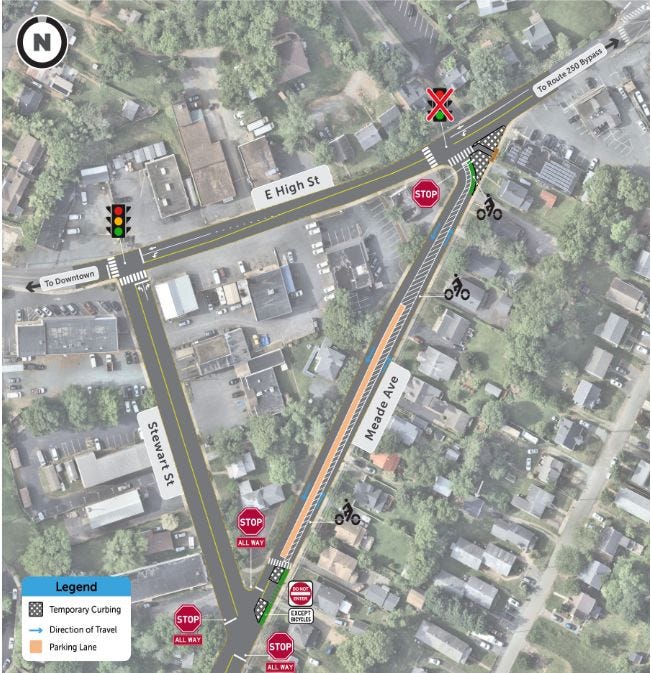
Superintendent Gurley presents budget request to City Council
The Charlottesville City Council sat down with the Charlottesville School Board on February 10 for a presentation on the latter’s proposed budget for FY26.
“A large portion, the largest portion, I should say, of our revenue source comes from city appropriation followed by state, followed by state revenue,” said Superintendent Royal Gurley at the beginning of the meeting.
The school system’s total proposed budget for FY26 is $124,916,920, a 5.13 percent increase over the current year. (review Gurley’s presentation)
The appropriation from Charlottesville to the school system makes up 62.4 percent of their budget for the current fiscal year with the state making up 21.2 percent followed by 6.8 percent from the federal government.
“The majority of our expenditures, like many organizations, falls within our salary and benefits,” Gurley said. “Salary and benefits make up about 74 percent of our total expenditures.”
Of that amount, 70 percent are in instructional roles, 19 percent are in support roles like custodians and food workers. Eleven percent are in administration.
As with city government, the school system is moving to a system where some employees are represented through collective bargaining. Gurley said this will include salary increases which will increase personnel costs by around $3.575 million. Many of the costs are related to changes to pay scales, but the overall effect would be a 5.5 percent salary increase for those under the agreement.
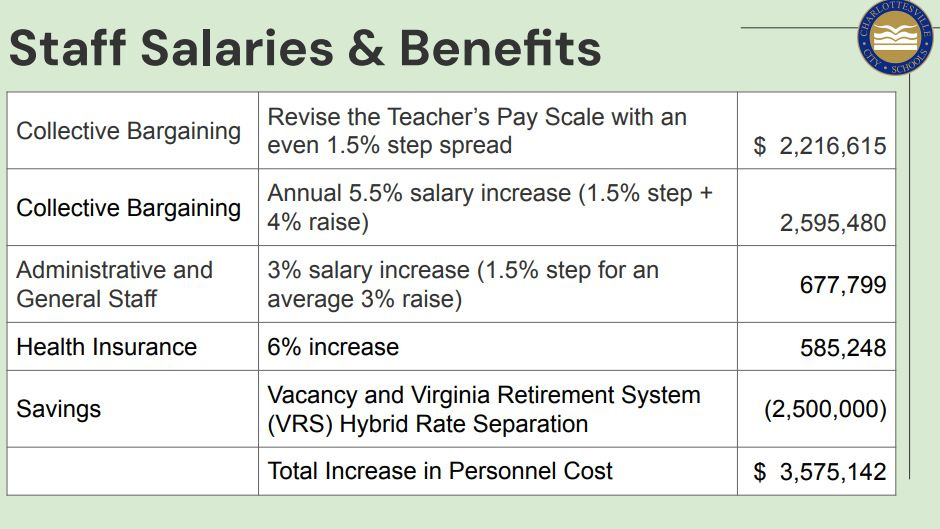
Gurley said the school system is seeking three additional positions to meet demand for instructors who can teach English as a second language. That’s at a cost of $284,646. There’s also an additional 8.5 positions requested to support efforts to improve on Standards of Quality scores. That would come at a cost of just under $1.26 million.
The school system’s total request of the city government for FY26 is an additional $4.93 million.
The city currently provides $1.25 million a year in capital improvement program funds for school maintenance projects. Gurley is requesting that be increased to at least $1.5 million a year to take construction inflation into consideration.
After Gurley’s presentation, City Manager Sam Sanders had one of his own about some structural issues related to the budget. He said that in each of the last three years, the school system did not use all of the money they were allocated for pupil transportation and school maintenance for a total of $908,000.76 from FY22 to FY24. Sanders called for new agreements between the city and school system to govern the four areas of capital construction, pupil transport, daily maintenance of spaces, and grounds management. (view the presentation)
“Today we have two agreements, not four agreements,” Sanders said. “That is also something that I point out as there's an issue in my mind there because we're not necessarily capturing what is the responsibilities that we each are owning.”
Sanders said new agreements would provide more budgetary certainty each year. For instance the Parks and Recreation Department currently provides ground maintenance as city schools, but that’s not captured anywhere.
Sanders also said there need to be conversations about what the next generation of school buildings will look like.
“Do we knock something down and replace it?” Sanders asked. “These are very, very tough conversations. I've been in other communities where it's hard to talk about tearing down 100 year old building, but if that 100-year-old building is not working for what it needs to be today, then it's a conversation we need to have.”
For that conversation to occur, Sanders said there also needs to be a fresh discussion about the city funds capital needs for the schools. He said there needs to be a formal document instead of relying on what appears to be an unwritten policy. These conversations will likely occur after this budget cycle.
The School Board will hold a special meeting on February 20 to adopt Superintendent Gurley’s proposed budget. Gurley will formally present the school’s budget at their regular meeting on March 4.
Second shout-out: Plant Virginia Natives
The snow has finally melted but it’s still not quite time to plant for spring. But, this is the time to plan and you can take some time to get ready for spring! Check out Plant Virginia Natives!
Plant Virginia Natives is part of a partnership with ten regional campaigns for ten different ecosystems across Virginia, from the Northern Piedmont to the Eastern Shore. Take a look at the full map below for the campaign for native species where you are in the Commonwealth. For the Charlottesville area, download a free copy of the handbook: Piedmont Native Plants: A Guide for Landscapes and Gardens.
Plant Northern Piedmont Natives is for anyone who works with native plants, whether you are a property owner, private consultant, landscape designer, nursery operator, conservation group, or local government.
Legislative update: Bill to allow localities to pass anti-rent gouging rules fails to pass
Time is running out for the 2025 Virginia General Assembly. February 17 was the last day for action by committees in the House and the Senate. The statistics dashboard on the Virginia Legislative Information System reports that 965 bills and resolutions have passed and 1,366 bills have failed. Breaking down the numbers any further may be a recipe for a headache and may cause an aversion to Sudoku.
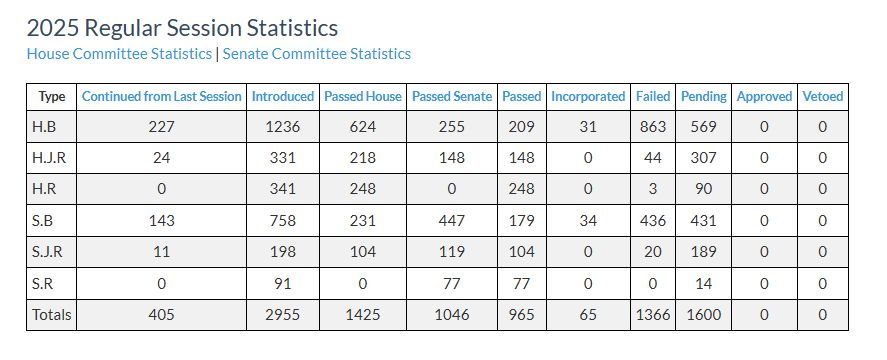
This time around, let’s take a look at bills that didn’t make it. There are many reasons why legislation fails, and many of these may come back for another time. The 2026 General Assembly will take place after a campaign where all 100 seats of the House of Delegates are up.
Before the session, Governor Glenn Youngkin announced he wanted there to be a further reduction of the personal property tax. He suggested that the General Assembly provide a credit to consumers. Senator Tara Durant (R-27) filed SB1443.
When legislation is introduced and assigned to a committee, fiscal impact statements are conducted. The Virginia Department of Taxation conducted the one for this bill.
“This bill would result in a General Fund revenue loss of $362.04 million in FY 2026, $367.66 million in FY 2027, and $372.47 million in FY 2028,” reads the impact statement. “However, because the Introduced Executive Budget pre-funds this tax credit by appropriating $1.1 billion to a special fund for the purpose of funding such credits, no budget amendment is needed.”
These impact statements also provide a glimpse into history. In the late 1990’s, Governor Jim Gilmore took office after a campaign against what is referred to as the “car tax.” This took the form of the Personal Property Tax Relief Act of 1998.
“The PPTRA originally was intended to eliminate the tangible personal property tax imposed on the first $20,000 of value on passenger cars, pickup or panel trucks, and motorcycles owned or leased by natural persons and used for nonbusiness purposes,” reads the statement.
The reduction was to happen in phases, but only if Virginia’s revenue growth was high enough to cover the cost of reimbursing localities for lost revenue. In 2004 the legislation was changed to a flat payment of $950 million to be shared among localities.
SB1443 was “passed by indefinitely” in the Senate Finance and Appropriations Committee on January 25.
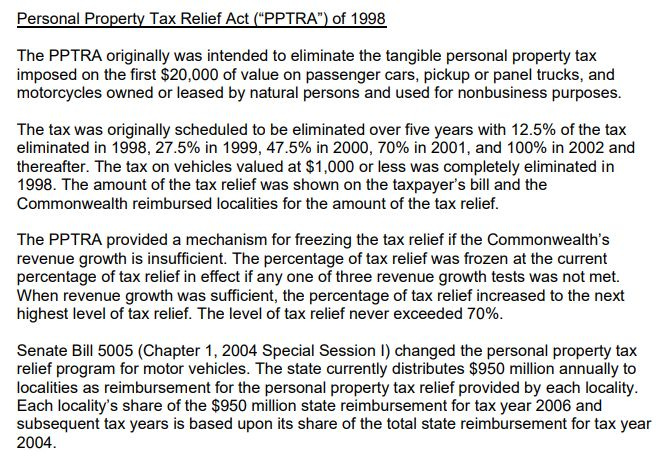
Here is a limited look at some of what has not passed this year.
Data centers:
SB1353 from Senator Kannan Srinivasan (D-32) would have required owners of any “high-energy facility” to submit a quarterly report to the Virginia Department of Environmental Quality with energy and water usage. This data would have been public. This was reported from the Senate Agriculture, Conservation, and Natural Resources Committee on a 9 to 5 vote, but did not make it out of the Finance and Appropriations Committee.
SB1196 from Senator Creigh Deeds (D-11) would have required data centers to meet certain energy efficiency standards before they could qualify for sales and use tax exemptions. This was left in the Finance and Appropriations Committee without a vote on February 5.
Elections:
SB1454 from Senator Glen Sturtevant Jr. (R-12) would have required the Department of Elections to take more steps to prevent non-citizens from voting. This was passed by indefinitely on a 8 to 7 vote in the Senate Privileges and Elections Committee.
SJ271 from Senator Mark Obenshain (R-2) would have called for a constitutional amendment on the 2025 ballot that would establish the right to work without having to join a union. This was passed by indefinitely in the Senate Privileges and Elections Committee on January 21.
SJ255 from Senator Aaron Rouse (D-22) would have directed the Joint Legislative Audit and Review Commission to study Virginia’s campaign finance laws. This made it out of the Senate on a voice vote on January 29, 2025 but the House Rules Committee passed it by indefinitely on a unanimous vote.
SB1469 from Senator Creigh Deeds (D-11) would have put a cap on the amount people and corporations could contribute to a state-wide campaign in Virginia, and put a cap on the amount someone could spend on their own campaign. This made is out of the Senate Privileges and Elections Committee on a 8 to 7 vote, but “failed to pass” from the Senate.
SB1185 from Senator Jennifer Carroll Foy would have required a more detailed definition of the word “coordinated” as it relates to campaign finance activities. This made it out of the Senate Privileges and Elections on a unanimous vote but was left in the Rules Committee.
Health care:
SB1493 from Senator David Sutterlein (R-4) would have established a right to access contraception. This was passed by indefinitely in the Senate Education and Health Committee on a 9 to 6 vote on January 23.
SB1480 from Senator Sutterlein would have removed a 16-hour-a-day cap on people who work with individuals with development disabilities. This was passed by indefinitely in the Finance and Appropriations on a 10 to 5 vote on January 29.
Infrastructure and Transportation:
SB1487 from Senator Luther Cifers (D-10) would have created two committees to study infrastructure resiliency to protect from hazards. This was passed by indefinitely in the Senate Rules Committee on a 7 to 4 vote. The legislation would have put a cap of $2 million to run the committees and also would have directed the National Guard to come up with a plan to maintain order after an attack or a natural disaster.
SB1374 from Senator David Suetterlein (R-4) would have directed the Secretary of Public Safety and Homeland Security to study the establishment of a centralized Continuity of Operations in the case of an emergency. This passed the House unanimously on January 29, 2025 but was tabled in the House Rules Committee of February 17, 2025.
SB1458 from Senator William Stanley Jr. (R-7) would allow someone to pay the Department of Motor Vehicles $100 a year to only have one license plate on a vehicle rather than the two currently required. This was passed by indefinitely in Senate Transportation Committee on a 9 to 6 vote on January 30.
SB1341 from Senator David Marsden (D-35) would have established the Wildlife Corridor Grant Fund to assist localities and regional entities that seek to build infrastructure to allow animals to safely cross highways. This was reported out of the Senate Agriculture, Conservation, and Natural Resources Committee on a unanimous vote but was left in the Senate Finances and Approrpriations Committee. VDOT estimated the program would cost $500,000 in the first year.
Land use and housing:
SB1468 from Senator Bill DeSteph (R-20) would have made it unlawful for “no person” to purchase land near or adjacent to a military base until they comply with 50 U.S.C. § 4565. This was passed by in the General Laws and Technology on a 9 to 6 vote on January 29, 2025.
SB1424 from Senator Schuyler T. VanValkenburg (D-16) would have prevented any corporation with assets in excess of $50 million from purchasing a single family home. This made it out of the Senate General Laws and Technology Committee on a 9 to 6 vote, but was left in the Senate Finance and Appropriations Committee.
SB1400 from Senator Saddam Azlan Salim (D-37) would have prohibited the use of algorithms to be used for the “purpose of setting or recommending the amount of rent to be charged to a tenant for the occupancy of a dwelling unit.” This was passed by indefinitely in the General Laws and Technology Committee with nine yes, three no, and three abstentions.
SB1312 from Senator Jeremy McPike (D-29) would have allowed localities with a high amount of tax-exempt properties to get reimbursed for least half of the lost revenue by the Commonwealth of Virginia. The threshold was defined as one percent. This was passed by indefinitely in the Senate Finance and Appropriations on a 7 to 6 vote.
SB1178 from Senator Ghazala F. Hashmi (D-15) would have given localities authority to encourage the development of more affordable housings on property owned by religious organizations or nonprofit organizations. This was reported out of the Senate Local Government Committee on a 12 to 3 vote but was left in the Finance and Appropriations Committee.
SB1136 from Senator Jennifer Boysko (D-38) would have allowed localities to establish anti-rent gouging ordinances. This failed to report from the Senate General Laws and Technology committee on a 6-6-3 vote.
Democracies function on details and a population that has access to them. That’s why I keep returning to this. I want people to become curious about how all of these things work and how they fit together. Please ask questions. Tell me when I may not have explained things correctly.
Reading material for #815
Lawn room applications increase, acceptance rate drops to 23.1 percent, Grace Little, Cavalier Daily, February 17, 2025
The hero of the Battle of Great Bridge was a sentry who took on an entire British platoon. He was also a free Black man, Leah Small, Cardinal News, February 18, 2025
License plate reader bill survives, but surveillance concerns loom, Charlotte Renee Woods, Virginia Mercury, February 18, 2025
Thoughts at the end of #815
The opera that debuted in Charleston, South Carolina on this day in 1735 was called Flora, or Hob in the Well. The citation in the Wikipedia entry is not complete, which always troubles me but it’s hard enough trying to patch up cvillepedia.
But, for now, let’s see what other resources I can find to see if this is true:
There’s a write-up on David Bruce Smith’s Grateful America Foundation
NPR has a write up a 2010 presentation of Flora in Charleston written in 2011
There’s a review of that presentation in the journal 18th Century Studies
That’s three. My point here is that this moment you are living in is part of a whole history of random things, and I encourage you to think deeply about who you are and where you are and when you are. I am hopeful that each and everyone of you take the time to write down your life. It is important. You are important.
I’m running out of time for today as I have an errand to run so I’m leaving it there. But today I’m also posting a video to something I watched last night I found to be very beautiful and rewarding. This is a moment from a village in Spain from 2010. I love the idea that someone from the 25th century might see this one day.





